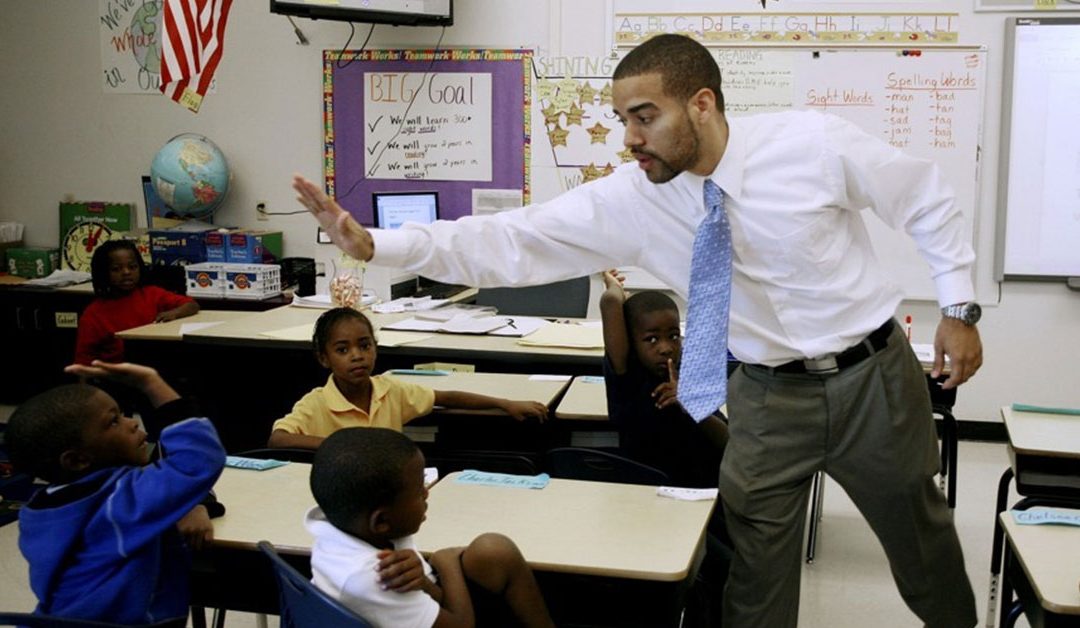School is often challenging and frustrating for African American males. Too often, they fall behind their peers, get poor grades, and fail to take advanced courses – or even graduate from high school. They are also more likely to be expelled or disciplined for various offenses, including quite minor ones. Failures or bad experiences in school can put young black males on the road to failure and even imprisonment later in life.
Teachers play a crucial role in helping African American males succeed – they can be pivotal to breaking cycles of frustration and failure. Research suggests that by the time students enter high school, they will spend more time with teachers than with parents. Because teachers weigh so heavily in student psychosocial development, they can boost African American boys and male teens. Yet teachers will not realize their potential to help unless they learn to better understand the perspectives and behaviors of African American males and respond to them in ways that foster positive developmental outcomes. Teachers must develop self-conscious cultural understandings and skills to guide and inspire African American males in their classrooms.
Why Some Teachers Struggle
For a number of reasons, teachers can have difficulties understanding and dealing with the young men of color in their classrooms.
- African American males may act in ways that do not fit teacher preferences for classroom etiquette. If they are growing up in fragile families and neighborhoods marked by violence, drugs, or economic blight, black boys and male teens may behave frenetically and respond to frustrations by acting tough and engaging in bravado posturing.
- Teachers often bring stereotyped attitudes into the classroom, especially if they have not had much life experience in relating to African American males. Negative stereotypes can lead teachers to react inappropriately toward students they could otherwise greatly help.
Racial and gender stereotypes are hard to avoid in American life. They come from media portrayals as well as from puzzling experiences and social learning over lifetimes. Common stereotypes portray black men as criminal, oversexed, lazy, violent, and unintelligent. And research shows that educators are not immune to picking up and acting upon such stereotypes. For example, a 2003 report looked at teachers’ perceptions of students who move about and hold themselves in certain ways. Teachers said that students who walked in an exaggerated stroll and took “cool” poses were more likely to engage in aggressive behavior and be low academic achievers or in need of special educational services than students with standard movement styles and erect posture. Teachers were, in short, making questionably stereotyped generalizations from minor behavioral cues. Of course students know this happens. African American males report that teachers who hold negative perceptions are hostile, indifferent, or fearful toward them.
What Teachers Can Do
Challenging as it may be, teachers can learn to think and behave in ways that will elicit better responses and let teachers and African American male students alike realize important goals.
- To cope with acting-out behaviors, teachers need to be aware of the factors that incite and reinforce aggressive bravado – and look for ways to ease students away from this response. Research I have done with colleagues suggests that, indeed, African American male students dealing with arduous life experiences tend to fall back on bravado attitudes and behaviors; but if they feel supported, they may chose alternative ways to cope.
- To get away from stereotypes, teachers and those who train and supervise them must steadily work to develop greater cultural sensitivity and self-awareness. Teachers, health practitioners, and others employed in settings where they influence people’s well-being must go the extra mile to develop habits of self-reflection and open-mindedness. For those who work with black males, this means understanding the roots of bravado reactions to frustration and learning how to encourage other modes of coping.
Strategies for Boosting Cultural Competence
Acquiring the necessary skills and outlooks is not easy for teachers – not for veterans and not for newcomers tossed into challenging environments by programs like Teach for America. Two kinds of approaches seem to work: indirect learning and direct personal interactions.
- Teachers can master materials about African American history and culture and participate in training programs, ideally programs that recur and encourage regular reflection on classroom experiences. It is not really possible to instruct teachers how to be culturally attuned and effective in one-shot “do it all” workshops or sessions.
- The other approach is more direct: teachers can learn by spending time talking with African American males about the challenges they face in and out of school, learning about their likes and dislikes and how they communicate, and letting them explain their goals and why they react in characteristic ways to certain situations. Listening allows teachers, regardless of racial background, not only to learn but also to show students they really care.
African American male students, I have argued, very much need teachers and educational administrators who have gained profound cultural understanding and worked through their own biases, and who have come to understand that bravado styles are often a socially ingrained way to deal with stress. With this awareness, teachers can encourage more constructive student responses conducive to success in school and beyond. Arriving at the necessary sensitivity and skill is hard, but not impossible. In fact, some of today’s most effective teachers of black males are those who once held stereotyped views, but have since modified their attitudes and learned how best to encourage troubled students who, despite the appearance of bravado, actually yearn for mentors who can guide them toward more fulfilling lives.
| www.scholarsstrategynetwork.org |
| September 2013 |


